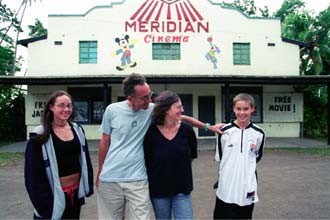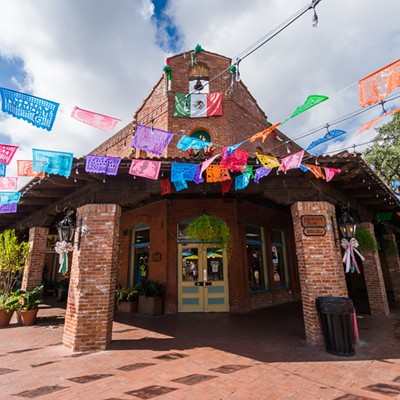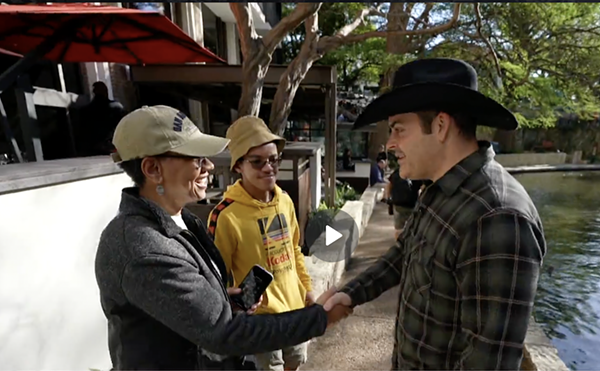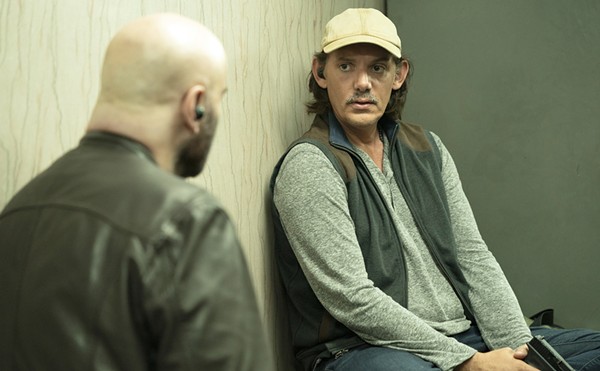| Indie distribution legend John Pierson moved his family to Fiji for a year, and showed free movies at the 180 Meridian Cinema, an act that drew as much flak as his daughter Georgia's American fashion. Hoop Dreams documentarian Steve James captured the Piersons' final month in their island retreat in Reel Paradise. |
Indie legend John Pierson took his family to Fiji to run the 'world's most remote theater'
Countless Americans dream of fleeing to an island paradise - getting away from the overdeveloped world, spending lazy afternoons on a beach, hanging with the natives. Very few of those daydreamers say to themselves, "You know what would make island life perfect? If I could spend all my time in a dark movie theater!"
But most Americans are not John Pierson, a man as integral to the independent film movement (or more, depending whom you ask) as Quentin Tarantino or Spike Lee. As a "producer's rep" (the guy who helps budding filmmakers connect with distribution companies), Pierson introduced the movie industry to Lee, Richard Linklater, Michael Moore, and Kevin Smith. Pierson's adventures in brokering those deals are chronicled in his entertaining book Spike, Mike, Slackers and Dykes (recently reissued as Spike Mike Reloaded).
While working on Split Screen, a TV series he produced for the Independent Film Channel, Pierson discovered the 180 Meridian Cinema, a shack-like movie palace he describes as "the world's most remote theater." Located on an island in Fiji, dependent on a gas-powered generator for electricity, it's not your average multiplex.
When the owners of the 180 decided to close up shop, Pierson knew he had to rescue the cinema. He uprooted his family - wife Janet, school-age kids Georgia and Wyatt - moved to Fiji for a year, and declared that the movies would be free. Amazingly, some people had a problem with that, which brings us to Reel Paradise, a documentary about the Piersons' last month in Fiji. Directed by Steve James (Hoop Dreams), the movie makes its regional premiere this month at Austin's South By Southwest Film Festival.
Reel Paradise's appeal isn't limited to viewers who share Pierson's extreme cinephilia; in fact, movies play a minor role. It's engrossing on a number of levels to watch this American family - not average by any means, but familiar with middle-class creature comforts - interact with a community in which extreme poverty is widespread and missionary-style morality is taken quite seriously. How does a mother react, for example, when her daughter's clothes (tame by our standards) scandalize the village's parents? What does it feel like to be seen as fabulously wealthy and to become a magnet for crime just because you own a laptop computer? Should Pierson be treated as a threat to the community because he allowed some kids to watch 8 Mile, or because by letting islanders - many of whom had never been able to afford a movie ticket - go to the movies for free, he is undermining the capitalist values instilled in them by generations of imperialists?
It's not always easy to decide which side to root for in this culture clash. Pierson's cantankerous nature ("I am a conflict magnet - anywhere," he told the Current in a recent interview) makes him less than eager to compromise with people who, however they came by their moral standards, view him as an intruder.
Other family members are more flexible. Thirteen-year-old Wyatt, for instance, is quickly at home, tuning into little customs and idioms as if born to them. Georgia, an attractive 16-year-old, is at home in a different way: Parents have a hard enough time dealing with adolescent sexuality; throw a foreign, disapproving community into the mix and it's almost comic.
Shortly after returning to the States, the New York family relocated to Austin, where Pierson is teaching a film production class at UT and working on a Split Screen DVD release with Aspyr Media. He and Janet have already become familiar faces on the local film scene, hanging out at Austin Film Society events while helping to promote the documentary on the festival circuit.
Having seen so many films grow from idea to finished product, they're more circumspect about their role as subject than many documentary stars are. Pierson, with his eye toward marketability, may be the only doc subject ever who thinks the movie he stars in should be shorter.
Still, Janet admits that "It's hard to have your life edited by someone else. No matter how sensitive they are, they're only getting part of the story. I appreciate Steve's narrative construct, but I do take exception to some of his points and the context he provides. I think we were more integrated in the community and he wasn't able to capture that because of the Fijians' language and camera shyness."
Like almost all documentarians, James does sculpt reality into his own feature-length plots and subplots. Viewers won't realize that Pierson was quite ill during almost half of the film shoot; only toward the end does the filmmaker collect the worst of the illness into a self-contained episode. And James, for the sake of a laugh, gives us the impression that Janet never wanted to embark on this adventure in the first place.
After the family's first short visit, she says, "I knew it was inevitable `John would` go back. When I received his e-mail that the theater was about to close and that he wanted to buy it, I just knew it was one of those big moments in our lives. 9-11 cemented the leap - it was like, Life is short, why not? In terms of making a film, it took me about 30 seconds. I know there's the quote in the film where I say 'No!' but frankly, the interview was cut short." After her initial resistance, Janet says, "I thought about how much documentaries have meant to me, and what a great adventure it was going to be. I realized that even though I'm not a performer in any sense, that I'd have to sacrifice my vanity and allow it to happen. I understood it was a good story."
And will the story have a sequel? Pierson says it would be "a blast" to return during Hollywood's annual summer blockbuster roll-out, when he could screen the broad action and comedy spectacles that drew the best response from Fiji crowds. He figures the island wouldn't get tired of him - just so long as each visit begins with a retrospective of all the movies The Rock made while the 180 Meridian Cinema was closed for business. •
By John DeFore















